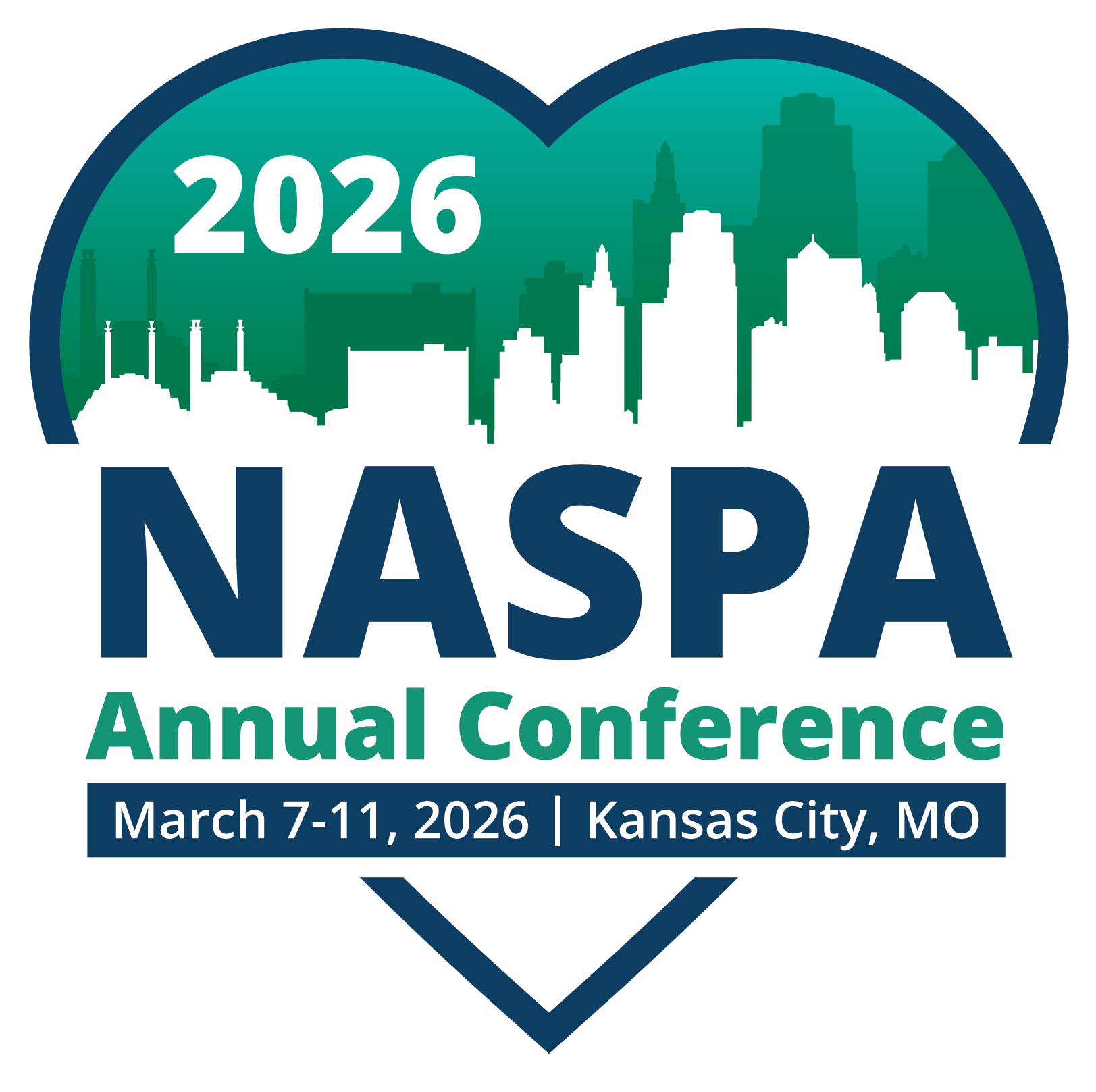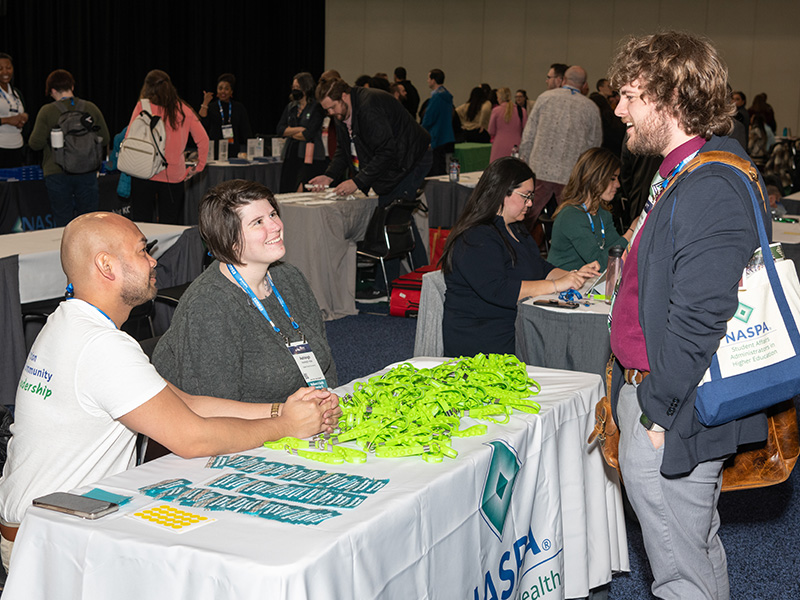2026 NASPA Annual Conference
March 7-11, 2026 • Kansas City, MO

2026 NASPA Annual Conference
March 7-11, 2026 • Kansas City, MO
The #NASPA26 Call for Programs and Reviewers is closed. Thank you for your submissions!
The program review process took place from September 10-24. Program decision notifications will be sent in early November.
Main Submission Timeline
September 3: Call for Programs Closed
Early November: Decision Notifications
Session Types
General Interest Sessions
General Interest Sessions are traditional program sessions that last for 50 minutes. They are designed to be interactive conversations between presenters and participants and allow attendees to grow skills and competencies.
SA Series: SA Speaks and SA Stories
Your story is unique, and now is the time to tell it! The SA Series provides presenters with the opportunity to bring inspiring and energetic narratives to the stage. SA Series proposals include a short video showcasing the presenter speaking about their topic.
Scholarly Paper Sessions
These sessions give presenters the opportunity to share innovative findings and conceptual arguments in the form of Scholarly Papers. Each 50-minute session will feature two authors who will present their papers, followed by comments from the discussant and a facilitated question and answer session.
Poster Sessions
Poster Sessions are designed to be impactful information sessions on research and institutional programs. During dedicated poster session time blocks in the conference schedule, presenters will be available at their posters to discuss their research and programs. Attendees can use this one-on-one time with presenters to learn more, ask questions, and talk through implications for their own campuses. Posters will also be available to view throughout the conference.
Pre-conference Workshops
The 2026 NASPA Annual Conference in Kansas City will include half-day, full-day, and multi-day Pre-conference Workshops. These learning sessions will take place on Saturday, March 7 and Sunday, March 8. Register for a Pre-conference Workshop to join colleagues and experts for an opportunity to discuss important and timely topics in depth!
Conference Focus Areas
FOCUS AREA
Elevating Student Affairs: Embracing Our Impact
Student affairs educators must leverage technology and data, in addition to understanding the return on investment (ROI) in our work, to elevate the profession, ensure outcomes are data-informed, and drive change that centers student success.
Redefining the Profession:
Leveraging Data and Technology:
Operational Excellence in Student Affairs:
Navigating Workforce and Economic Trends:
The Future of Work in Student Affairs:
FOCUS AREA
Focusing on People: The Heart of the Student Affairs Profession
Student affairs is more than a profession - it is a career shaped by individuals from diverse backgrounds who bring unique perspectives at every stage of their journey. From entry-level professionals to faculty to senior-level practitioners, each contributes to the field's evolving identity. Equally important is celebrating the often-unsung contributions of middle managers—our directors and supervisors—who shape the future of student affairs through mentorship and innovation.
Understanding Entry-level Professionals:
Supervision Beyond Personality Assessments:
Celebrating Leadership and Evidence-based Practices:
Restoring Purpose and Sustained Joy in the Work:
Tools for Professional Growth:
FOCUS AREA
Pathways to Student Success: Thriving in Higher Education
As the landscape of higher education evolves, institutions are tasked with fostering student success amidst complex challenges. Student affairs professionals play a critical role in navigating crises, mental health needs, student goals, and institutional priorities, all while supporting the staff who are essential to student success. This focus area invites participants to think critically about the principles guiding this work, from grant funding and public-private partnerships to breaking down systemic barriers and supporting the diverse, often under-discussed identities that shape student experiences.
Redefining the Profession:
Leveraging Data and Technology:
Operational Excellence in Student Affairs:
Navigating Workforce and Economic Trends:
The Future of Work in Student Affairs:

KCs in KC
This year marks the 25th Anniversary of the NASPA Networks transitioning to Knowledge Communities. In 1989, through a restructure of task forces, networks, and advisory groups, the following NASPA Networks were approved: new professionals, small colleges, fraternities and sororities, ethnic minorities, gay, lesbian, and bisexual, urban institutions, women in student affairs, adult learners, and community colleges. These networks continued to grow, and members formed new networks in response to specific issues of concern in the field. In 2001, the NASPA Board of Directors explored a recommendation to reshape the networks into Knowledge Communities. This new format would leverage technology to facilitate communication and information sharing among members. Knowledge Communities serve as portals to NASPA, through which members can engage with one another regardless of geographic location. Today's knowledge communities encompass a diverse range of topics and serve as a hub for developing and connecting experts in these focus areas. Join us throughout the 2026 NASPA Annual Conference in celebrating and engaging with Knowledge Communities!
Meeting and Receptions Requests
The NASPA Annual Conference is an opportunity for NASPA Constituent Groups and institutions to host events. Submit a meeting/reception request to plan a gathering for your community at #NASPA26 in Kansas City.
Meeting/Reception Request Timeline
October 1: Meeting/Reception Requests Closed
Early November: Meeting/Reception Confirmations
Mid-November: Catering/AV Order Process Opens
December 10: Catering/AV Orders Due
Schedule At-a-Glance
Time and sessions subject to change. Please check back regularly for latest information.
